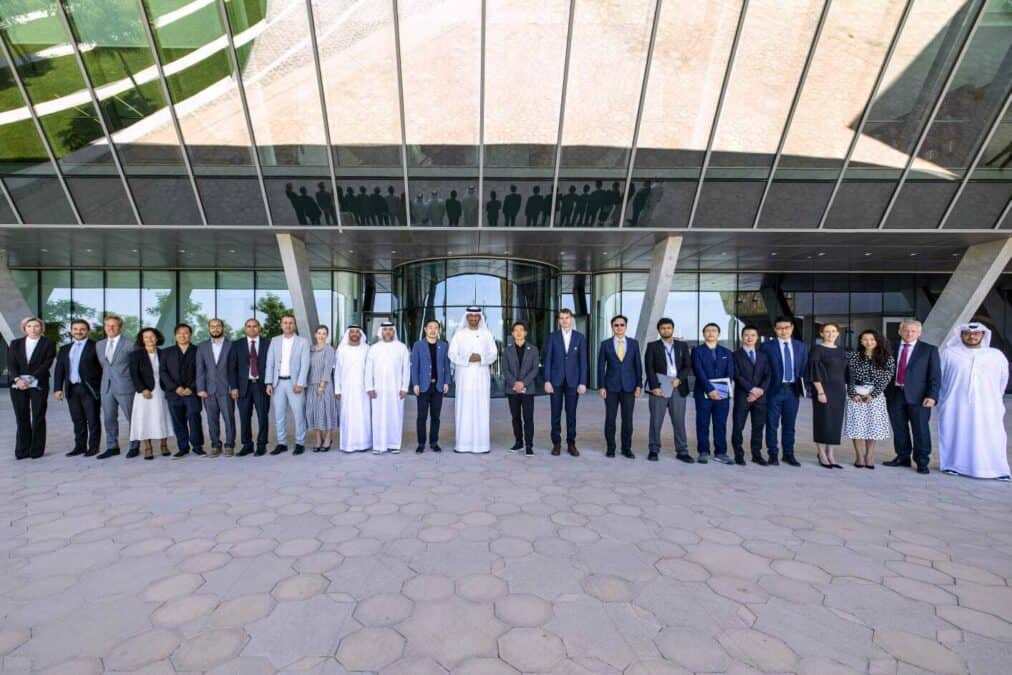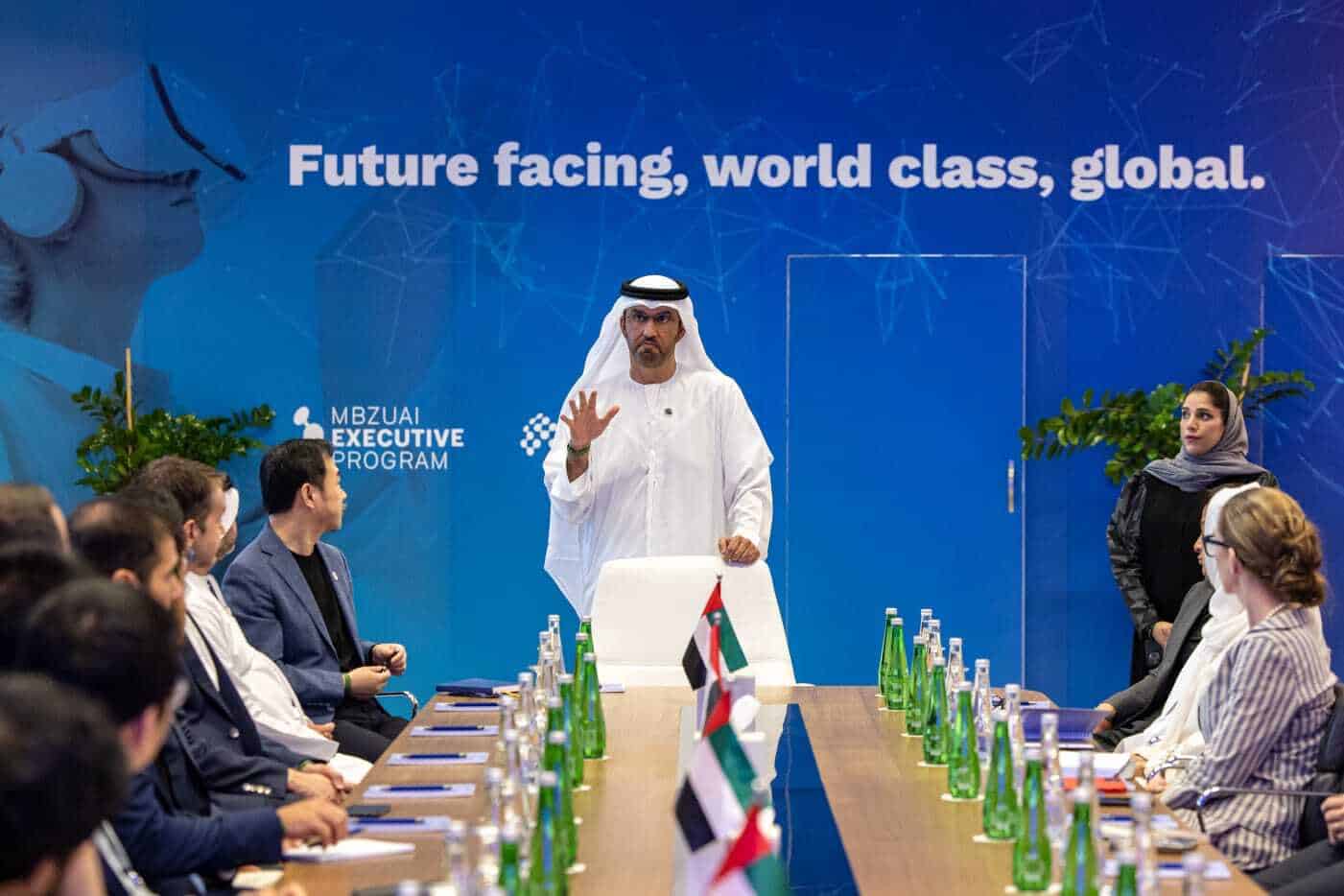ABU DHABI, UAE — Artificial intelligence research will play a key role in harnessing global opportunities and creating practical, tangible solutions to increase the adoption of AI and generate economic and social value, according to Dr. Sultan Ahmed Al Jaber, UAE Minister of Industry and Advanced Technology, and President-Designate of COP28. He made these remarks during a visit to the Mohamed bin Zayed University of Artificial Intelligence (MBZUAI).
Dr. Al Jaber, who also serves as the Chairman of MBZUAI, stated, “The adoption of AI across industries will help achieve the nation’s goals in advancing technology and diversifying its economy. Projections indicate that AI solutions are set to contribute an estimated $13 trillion to the global GDP by 2030, optimizing the industries of tomorrow and significantly improving the lives of billions of people. We stand on the brink of a technological revolution, and MBZUAI is providing a world-leading pipeline of AI specialists and an ecosystem that nurtures industrial collaboration to support the UAE’s innovation trajectory.”
During his visit, Dr. Al Jaber, accompanied by G42 CEO Peng Xiao and Professor Eric Xing, President and University Professor of MBZUAI, met with leading researchers from MBZUAI and the Inception Institute of Artificial Intelligence (IIAI). They discussed key research projects aimed at addressing UAE national priorities, including sustainable environment and infrastructure, world-class healthcare and education systems, and exploring large language models, particularly in Arabic.
The Chairman also met with MBZUAI faculty, focusing on the institution’s three core pillars of climate, health, and education. He reviewed research on energy-efficient language models and machine learning systems, maximizing solar energy outputs, and real-time autonomous malaria diagnosis and assessment. Dr. Al Jaber was also given a demonstration of an environmentally friendly chatbot called Vicuna, which is a global collaboration between researchers at MBZUAI, UC Berkeley, Carnegie Mellon University, Stanford, and UC San Diego.
Peng Xiao commented, “The UAE’s unwavering commitment to advancing artificial intelligence and digital transformation is evident in thriving academic institutions like MBZUAI. In the three years since its establishment, MBZUAI has attracted world-renowned researchers from the most prestigious educational institutions globally. This concentration of talent has catalyzed a massive wave of growth in the local AI ecosystem and has helped the UAE build a strong platform for AI development, fostering an environment conducive to driving meaningful and sustained innovation with far-reaching impact across various industries worldwide.”
Dr. Al Jaber also emphasized the role of AI in climate-based solutions, stating, “AI will contribute to the UAE’s net-zero strategic initiative by 2050 and help unlock advances in climate progress. The technologies being developed today have the potential to increase energy efficiency, reduce emissions, and ensure that economic growth and climate progress go hand-in-hand. Advances in technologies like artificial intelligence, analytics, and robotics will enable us to better decarbonize high-emitting sectors and measure and reduce energy consumption and emissions.”
If applied globally, AI could help reduce greenhouse gas emissions by up to 5.3 gigatons of carbon dioxide equivalent gases (CO2e), playing a major role in limiting global temperature increases to 1.5C.

During the visit, Dr. Al Jaber was also updated on a joint MBZUAI and IBM project aimed at providing a data engine to identify urban areas in Abu Dhabi with excessive heat. This information could be used to inform climate and sustainability policies. With its capability to analyze vast quantities of global data, AI can be used to measure greenhouse gas emissions and climatic trends, and identify potentially important patterns that will prove invaluable to scientists and policymakers.
Professor Eric Xing stated, “MBZUAI is already leading global efforts to develop and deploy sustainable AI solutions and applications as we showcased today. Harnessing the power of AI, we are delivering state-of-the-art research that can solve the world’s most pressing issues such as in healthcare, education, and environmental sustainability. There has never been a greater need for well-trained AI professionals and investments into AI R&D. By pushing the boundaries of AI and continuing to collaborate with key industry leaders for the application of AI solutions, we can have profound social and economic impact. In the recent hype of AI, we must remain focused on its massive potential for good.”
MBZUAI is among 12 UAE-based universities and higher education institutions to join the Universities Climate Network (UCN). The taskforce enables collaboration to advance ambitious climate action nationally and internationally to accelerate positive change for a low-carbon, resilient world. Eight MBZUAI students from eight countries have also been selected to participate in the Climate Ambassadors Program (CAP). They recently took part in an immersive roleplay simulation of a COP28 UAE proceeding, where they were given an opportunity to study, explore, and learn about the diverse challenges nations face due to climate change.

